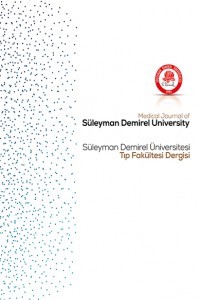Kliniğimizde Son 4 Yılda Yapılan Amniyosentez Vakalarının Retrospektif Analizi: Tek Hekim Sonuçları
Amniyosentez, genetik taný, fetal kayýp
___
- Steele MW, Breg WR Jr. Chromosome analysis of human amniotic-fluid cells. Lancet 1966;1:383-5.
- Jacobson CB, Barter RH. Intrauterine diagnosis and management of genetic defects. Am J Obstet Gynecol 1967;99:796-807.
- Seeds JW. Diagnostic mid trimester amniocentesis: How safe? Am J Obstet Gynecol 2004;191:608-16.
- Þen C. Amniyosentez ve koryon villus örneklemesi. Perinatoloji Dergisi 2002;10:55-8.
- Þener KY, Durak B, Tanýr HM, Tepeli E, Kaya M, Artan S. Kliniðimizde 7 yýllýk amniosentez sonuçlarý. Perinatoloji Dergisi 2006;14:170-5.
- Evans MI, Andriole S. Chorionic villus sampling and amniocentesis in 2008. Curr Opin Obstet Gynecol 2008;20:164-8.
- Tseng JJ, Chou MM, Lo FC, Lai HY, Chen MH, Ho ES. Detection of chromosome aberrations in the second trimester using genetic amniocentesis: experience during 1995-2004. Taiwan J Obstet Gynecol 2006;45:39-41.
- Evans MI, Wapner RJ. Invasive prenatal diagnostic procedures 2005. Semin Perinatol 2005;29:215-8.
- Centini G, Rosignoli L, Kenanidis A, Scarinci R, Petraglia F. A report of early (13 + 0 to 14 + 6 weeks) and mid-trimester amniocenteses: 10 years' experience. J Matern Fetal Neonatal Med 2003;14:113-7.
- Yüce H, Çelik H, Gürateþ B, Erol D, Hanay F, Elyas H. Karyotip analiz amacýyla genetik amniyosentez uygulanan 356 olgunun retrospektif analizi. Perinatoloji Dergisi 2006;14:73-6.
- Han SH, An JW, Jeong GY, Yoon HR, Lee A, Yang YH, et al. Clinical and Cytogenetic Findings on 31,615 Mid-trimester Amniocenteses. Korean J Lab Med 2008;28:378-85.
- Yang YH, Ju KS, Kim SB, Cho YH, Lee JH, Lee SH, et al. The Korean collaborative study on 11,000 prenatal genetic amniocentesis. Yonsei Med J 1999;40:460-6.
- ACOG Committee on Practice Bulletins. ACOG Practice Bulletin No. 77: screening for fetal chromosomal abnormalities. Obstet Gynecol 2007;109:217-27.
- Tabor A, Philip J, Madsen M, Bang J, Obel EB, Nİrgaard-Pedersen B. Randomised controlled trial of genetic amniocentesis in 4606 low-risk women. Lancet 1986;1:1287-93.
- Roper EC, Konje JC, De Chazal RC, Duckett DP, Oppenheimer CA, Taylor DJ. Genetic amniocentesis: gestation-specific pregnancy outcome and comparison of outcome following early and traditional amniocentesis. Prenat Diagn 1999;19:803-7.
- Papantoniou NE, Daskalakis GJ, Tziotis JG, Kitmirides SJ, Mesogitis SA, Antsaklis AJ. Risk factors predisposing to fetal loss following a second trimester a m n i o c e n t e s i s . B J O G 2 0 0 1 ; 1 0 8 : 1 0 5 3 - 6 .
- Thorp JA, Helfgott AW, King EA, King AA, Minyard AN. Maternal death after second-trimester genetic amniocentesis. Obstet Gynecol 2005;105:1213-5.
- Erdemoðlu M, Kale A. Genetik amaçlý amniyosentez uygulanan 183 olgunun prospektif analizi. Dicle Týp Dergisi 2007;34:170-5.
- ISSN: 1300-7416
- Yayın Aralığı: Yılda 4 Sayı
- Başlangıç: 2015
- Yayıncı: Süleyman Demirel Üniversitesi
Erman ZENGİN, Ahmet Kişioğlu, Yonca SÖNMEZ
Omuz Ağrılı Hastalarda Farklı Analjezik Akımların Etkinliğinin Karşılaştırılması
Üriner inkontinans tedavisinde davranışsal tedavi yöntemleri
Beyin Ve Karaciğeri Tutmuş Bir Alveolar Kist Hidatik Olgusu
A.furkan TAMER, Kerim ÇAYIR, Mehmet BİLİCİ, Salim TEKİN, Fatih ALBAYRAK, Suat EREN
Behçet hastalığı patogenezindeki yenilikler
Mehmet YILDIRIM, Yıldız KILINÇ, Ali CEYHAN
Isparta ve çevresinde görülen çene kistlerinin retrospektif değerlendirilmesi
Timuçin Baykul, Gülperi Koçer, Müge Çına Aksoy, Semra Kayaaltı Özarslan, Hakan Kahraman, Orçun Toptaş, Hasan Şimþek, Mustafa Tüzüm
Nadir Görülen Bir Vulvar Tümör: Lipom
Kliniğimizde Son 4 Yılda Yapılan Amniyosentez Vakalarının Retrospektif Analizi: Tek Hekim Sonuçları
Multidisipliner Yeni Bir Bilim Dalı: Biyoinformatik ve Tıpta Uygulamaları
